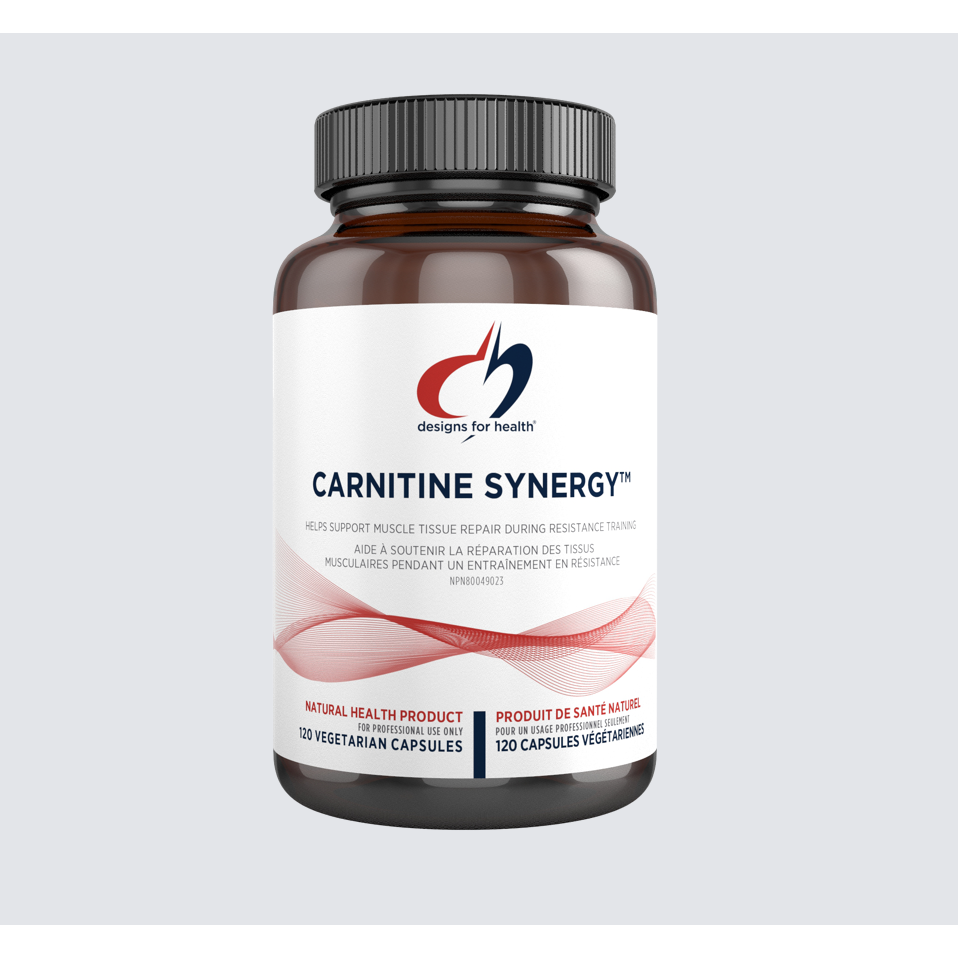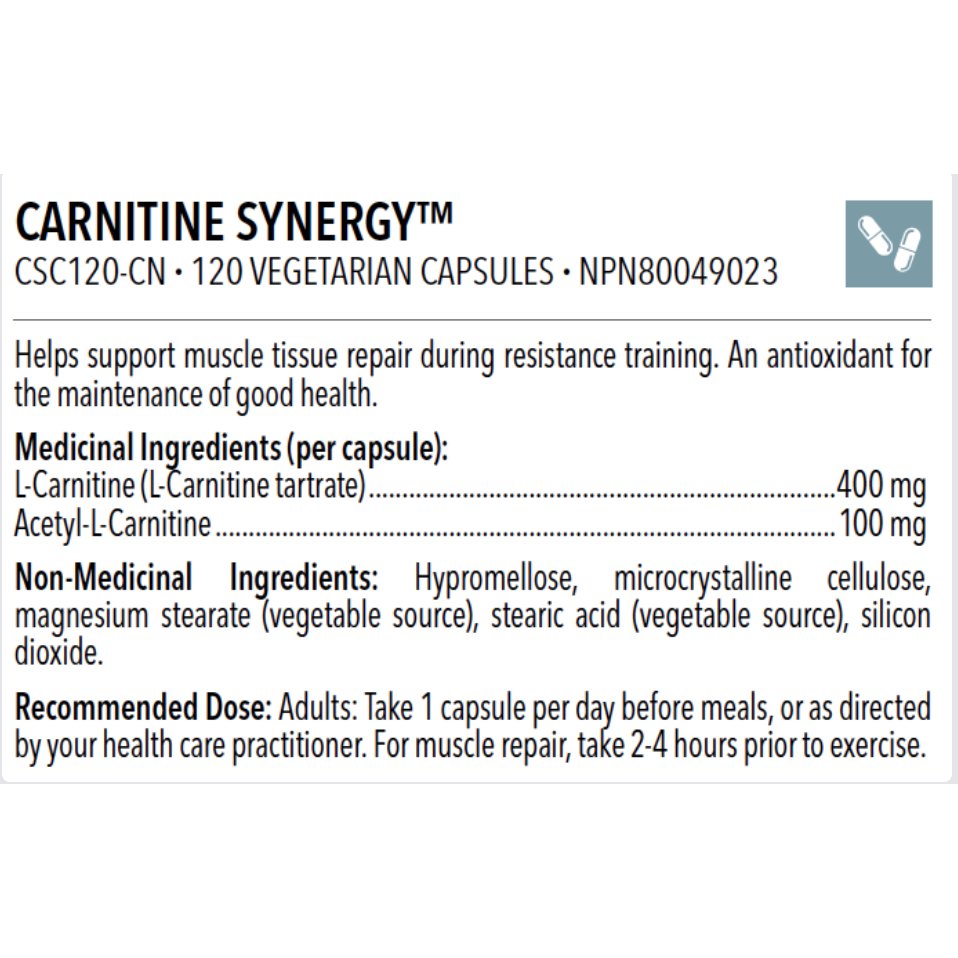

Carnitine Synergy™
L-Carnitine is a compound naturally occurring in all foods, but significant amounts are only found in dark meats (due to high concentration of mitochondria), for example: lamb (190 mg/4 oz), beef (143 mg/4 oz), poultry(13 mg/4oz), fish (3-10 mg/4oz), cheese (1-13 mg/4oz), rice (0.3 mg/4oz), tomato (0.1 mg/4oz). Approximately 20 mg/day of carnitine is synthesized in the human body (kidney and liver) from methionine and lysine, requiring other cofactor nutrients such as iron and vitamins C, B3 and B6. Many metabolic states may require more than this synthesized amount. Carnitine supplementation may be especially necessary for vegetarian diets or when dark meats are consumed in small amounts, because neither preformed carnitine nor its precursor amino acids are ingested in adequate amounts to support optimal health.
Carnitine supplementation in the amount of 1-4 g/day was shown to provide metabolic support for the following:7
• Manymetabolicstatesthatrequireanenhancedoxidationoffat,suchas:excessbodyfat,hightriglycerides,
sustained exercise (aerobic or resistance training), low carbohydrate/high fat diets
-
A variety of conditions that require an intensive support of the heart muscle and the immune system cells
-
Other conditions such as: pregnancy, low sperm motility, chronic fatigue, Raynaud’s syndrome, dialysis
complications
-
Side effects from treatment: interferon therapy for hepatitis C, HIV anti-virals or chemotherapy
Carnitine supports the metabolism of fat during weight loss diets.
L-Carnitine is a nutrient that supports the transport of fat into the mitochondria, where it can be burned and converted into energy. Several studies have shown that L-carnitine supplementation improves the body’s efficiency to burn fat, even if the subjects are not overtly deficient in carnitine.2
One study investigated the effect of four weeks of supplementation with 1g L-carni-tine three times per day on 100 overweight patients following a diet of 1200 Kcal/-day. The carnitine group lost an average of 9.7lb vs 7.8lb in the placebo group. Thus,L-carnitine supplementation supported the weight loss process with an additional 2.1lb in one month. The authors concluded that “the study supports the assumptionformulated on the basis of other studies that carnitine supplementation leads to increased desirable weight loss, over and above diet and exercise.”3 Authors have also emphasized that L-car- nitine’s metabolic advantage will be especially realized when administered along with a regimen that ensures a caloric deficit through adequate diet plus exercise. Special attention should be given to the amount of carbohydrate ingested. Another study showed that supplementation with L-carnitine increased loss of fat in the urine, in addition to increasing fat burning for energy.7 This shows two different venues in which L-carni- tine provides a metabolic advantage.
Carnitine supports the preservation of lean body mass, especially during anaerobic exercise and fat loss.
It is especially important to preserve lean body mass during fat loss in order to prevent a reduction in metabol- ic rate. Carnitine supplementation was shown in several studies to support an actual increase in lean body mass, in addition to reducing the amount of exercise-induced muscle tissue damage.11 This benefit applies to both resistance and endurance type exercises. This means that carnitine supplementation prior to a workout results in less muscle soreness.
Carnitine supports the metabolism of fat during exercise and spares carbohydrate stores.
Fat burning is intensified during endurance exercise, and L-carnitine was shown to increase the efficiency of this process, allowing the body to tap into fat stores more than sugar stores (the blood glucose or the glyco- gen from liver and muscles).5,13 This may also reduce the chance of becoming hypoglycemic during exercise.
Carnitine supports enhanced exercise performance.
L-Carnitine was shown to support exercise performance, most likely by enhancing the delivery of fat fuel to the muscles. Four grams per day of L-carnitine, over a period of two weeks increased a typical marker of aero- bic capacity (VO2 max) by 6%.12 It was also shown to increase the anaerobic threshold, delaying the event where the muscles feel a “burn” from lactic acid.
Carnitine supports the heart muscle and related conditions: congestive heart failure, ischemia, myopathy.
“L-Carnitine is a useful therapeutic agent for the treatment of congestive heart failure in combination with traditional pharmacological therapy.”6 This may be due to the fact that carnitine is supporting the delivery of fat to the heart muscle, which is its main fuel source. A review of the literature emphasizes the results of the three trials with carnitine, which have shown significant benefits for patients with myocardial ischemia.9
Carnitine supports the normalization of blood lipids: triglycerides, HDL, Lp(a).
“Serum-lipid concentrations were determined in patients treated with 900 mg/day. Serum-triglyceride was significantly reduced and concentrations continued to decline as carnitine administration continued.”10 “1 g per day of L-carnitine over a period of 10-15 weeks caused an increase in HDL.”14
One study found L-carnitine to lower serum triglycerides by 28%, total cholesterol by 12%, while raising HDL by 12%.15, 16 Another study concluded: “from a general sample of 3525 cardiopathic patients treated with 2 g daily of L-carnitine during 1 year...after 12 months of administration only 282 patients showed abnormal levels of cholesterolemia.”9
“L-Carnitine (2 g/day) significantly reduced Lp(a) levels (-7.7% versus baseline and -11.7% vs placebo treat- ment), the reduction being more dramatic in the subjects with the more marked elevations. In a significant number of subjects, the reduction of Lp(a) resulted in a return of this major cardiovascular risk parameter to the normal range.”4
How to Take:
In general, L-carnitine will be absorbed faster and with higher peak plasma when ingested on an empty stom- ach, because it does not compete for absorption with other amino acids or peptides. When taken on an empty stomach, plasma levels of carnitine will remain elevated for 3-4 hours. It is not recommended late in the day due to its energizing effect. Do not take high doses too fast, as it may have a laxative effect. Carnitine is espe- cially useful to take right before exercise, for both resistance and endurance training. When taken with meals, it will achieve a lower but more prolonged elevated plasma level, about 7-8 hours, supporting at first the metabolism of the fat ingested with meals and subsequently that of the fat released from the adipose tissue. It is important to keep in mind that when consuming an excessively high carbohydrate diet, fat release from the adipose tissue is impaired by high levels of insulin. In this case, fat cannot be transported into the mito- chondria with the help of carnitine for it to be burned off, because it does not have a chance to first get in the bloodstream. The only benefit that carnitine can have in this case would be to support the transport of the fat absorbed from the meals into the mitochondria for burning. As a result, carnitine may reduce the chance of gaining body fat during a diet high in carbohydrates and fat, but fat loss is very unlikely in this metabolic situa- tion. So, in order to maximize fat loss and benefit from L-carnitine supplementation, the amount of daily carbohydrate intake should be minimized and adjusted to match general activity levels and exercise type and duration.
Carnitine SynergyTM | 120 Vegetarian Capsules | NPN80049023 | CSC120-CN
Medicinal Ingredients (per capsule):
L-Carnitine (L-Carnitine tartrate) ....................................................................................................................................... 400 mg Acetyl-L-Carnitine ..................................................................................................................................................................... 100 mg Non-Medicinal Ingredients: Hypromellose, microcrystalline cellulose, magnesium stearate (vegetable source), stearic acid (vegetable source), silicon dioxide. Recommended Dose: Adults: Take 1 capsule per day before meals, or as directed by your health care practitioner. For muscle repair, take 2-4 hours prior to exercise.
Choose options


